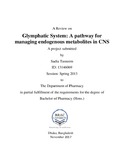Glymphatic system: a pathway for managing endogenous metabolites in CNS
Abstract
Glymphatic pathway is one of the recent discoveries of neuro pharmacology which is a brainwide
paravascular system to exchange cerebrospinal fluid (CSF) and interstitial fluid. This
system is associated with the clearance of soluble proteins and metabolic neurotoxic waste
products from the brain. Along with the elimination of metabolic waste products from the
central nervous system, glymphatic system functions as a facilitator to distribute different
compounds such as neuromodulators, amino acids, glucose etc. Recently, it has been observed
that suppression of glymphatic system plays a pivotal role in different neurodegenerative
diseases like Alzheimer’s disease, stroke, Parkinson’s disease, Huntington. Moreover, scientists
have explored the association of glymphatic system with sleep which clearly reflects the
importance of sleep and the activation of the glymphatic system during sleep. The effect of
aging and traumatic brain injury on the functions of glymphatic system has also been discovered
and mentioned in recent researches as well. Since the concept of glymphatic system is relatively
a new addition in to the science of neuropharmacology, the present study is aimed to review the
structural components, mechanism of action, factors related to glymphatic system and the
significance of glymphatic system associated with neurodegenerative diseases. Further
characterization and research on glymphatic system may open up new doors for the treatment of
different neurodegenerative diseases. Therefore, the aim of this review paper is to assemble
available information regarding glymphatic system and present it in a concise and more
constructive manner.

